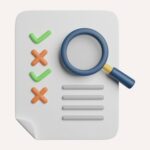For creating a long-term wealth necessitates the creation of good financial habits is essential.
By implementing such habits, you can regain control of your money and strive toward financial independence.
By paying off high-interest debt, making a budget, investing in your future and living below your means are some of the habits that might help you develop wealth.
We’ll look at 12 financial habits that can allow you to build long-term wealth in the article below.
1. Consistently monitor sources of income and expenses
Monitoring your sources of income and expenses on a regular basis is an essential financial habit since it allows you to keep control of your money and encourages better financial decision-making.
Checking your expenses might help you identify overspending in certain areas and adjust your budget appropriately.
It also assists you in proactive budgetary control and smoothing out expenditures over time. This is one of the wise financial practices that wealthy people do.
2. Spend less than you earn
Spending less than you earn is an important financial habit that may assist you in building wealth and avoiding debt.
Financial gurus promote it as a strategy to conserve money and enhance your cash flow.
Building this habit entails cutting down on your spending and making a budget that enables you to live within your means.
You can achieve financial stability and work toward your long-term financial objectives by lowering your debt and boosting your savings.
3. Create a budget and stick to it
Making and sticking to a budget is a beneficial financial habit for various reasons.
For instance, it can assist you in getting financial independence and freedom by putting you on the correct track to meeting your financial objectives, spending within your means, and saving for the future.
Second, much like keeping to a diet or an exercise plan, sticking to a budget takes work, but it may help you manage your money and prevent overspending.
Finally, making a budget is a good habit to develop in order to manage your money and remain on top of your debt.
Overall, adopting and adhering to a budget may assist you in achieving financial stability and meeting long-term financial goals.
4. Set financial goals and track progress towards them
Setting financial goals and measuring progress toward them is a powerful financial habit that may help you grow wealth, offer direction and purpose, and keep you on track to financial success.
Setting realistic financial objectives allows you to cultivate the discipline and habits required to attain them.
Financial goals can be applied to any aspect of your money management abilities that you want to improve, and they can help you build successful money habits that will give you a better chance of financial well-being later in life.
Creating financial objectives assists you to have a clear knowledge of your financial condition and makes it easier to make sound financial choices.
5. Invest in a diversified portfolio
Investing in a diversified portfolio is crucial because it lowers risks, helps smooth returns, and improves long-term portfolio performance.
Investors may lessen the risk of losing money on a single security or asset by diversifying their assets across asset classes.
Diversification does not guarantee investment returns or remove the chance of loss, but it may aid in risk management.
A well-diversified portfolio will include a mix of stocks, bonds, and other assets.
6. Avoid debt or pay it off as soon as possible
Financial experts recommend avoiding debt or paying it off as quickly as possible since it might harm your financial health.
Having to much debt might also make it difficult to save money and invest for the future.
Debt repayment as early as possible may help you build good financial habits, improve your credit and free up cash for other debts.
It is critical to have a budget and a strategy in place to pay off your debts on schedule.
7. Build an emergency fund
Having an emergency fund is a good financial habit to have since it allows you to pay unforeseen expenditures without getting into debt.
Emergencies can strike at any moment, and having an emergency fund can help you weather financial storms.
This is particularly crucial if you have debt since it may help you prevent more borrowing. The COVID-19 pandemic has shown us the value of maintaining an emergency fund.
Creating a realistic savings goal and putting money aside for an emergency fund might help you develop effective saving habits.
8. Maximize contributions to retirement accounts
Contributing to retirement accounts as much as possible is a healthy financial practice since it enables you to take advantage of potential investment gains over time.
You can benefit from tax savings and company matching programs if you contribute the full amount permitted.
Although increasing contributions might be advantageous, it may not be realistic for everyone’s financial condition.
Yet, there are a variety of tactics and ideas available to assist consumers optimize their retirement savings, such as starting early, diversifying assets, and seeking professional advice.
9. Live below your means
Staying within your requirement is a solid financial habit with several advantages.
This will help you in saving money, pay off debt and accumulate wealth over time.
You can avoid having financial stress and have a greater control over your money through spending less than you earning.
Living within your needs may also assist you in achieving your financial objectives, such as purchasing a house or retiring comfortably.
It may also help to have a simpler and more meaningful living as you learn to value the things that actually matter. Overall, living within your means is a prudent financial decision that may pay you in a variety of ways.
10. Continuously educate yourself about personal finance
It is important to continue your education in personal finance since it will help you handle your money more successfully.
This involves learning how to budget, save, and invest.
By increasing your financial literacy, you will be able to make more educated financial choices and prevent expensive errors.
11. Avoid impulsive purchases
Purchases made on the spur of the moment might be damaging to your financial health.
Rather than a strong desire for the object itself, these purchases are often undertaken to meet an emotional need or alleviate stress.
Overspending and debt may result from impulse purchases, which can have a detrimental influence on your financial planning.
Stick to a shopping plan, examine why you are pursuing the objective, pay with cash rather than cards, log weekly saving contributions, and utilize a savings account to minimize impulse purchases.
You may improve your financial habits and work toward your financial objectives by limiting impulsive purchases.
12. Surround yourself with financially responsible people
Surrounding oneself with financially responsible individuals might help you develop better financial habits.
Those who are financially responsible may act as role models and provide direction and help in making great financial choices.
Living within your means, budgeting, checking your finances, and conserving money are all examples of financial responsibility.
Financial responsibility is crucial since it influences every aspect of your life and may decrease stress while increasing financial security.








